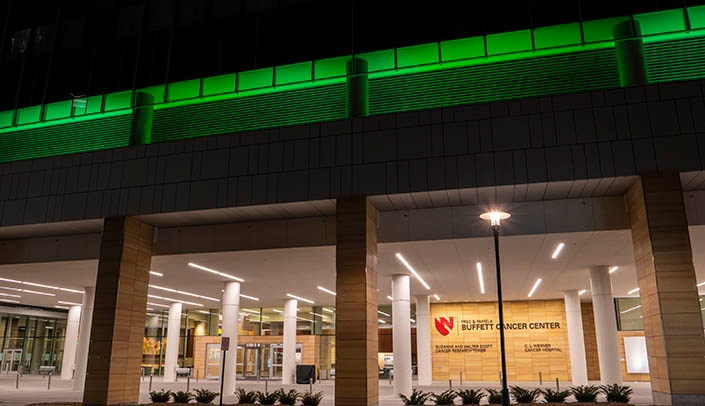In celebration of Earth Month this year, Lindsay Neemann, manager of facilities and planning, sat down with UNMC Chancellor Jeffrey P. Gold, MD, to discuss sustainability efforts at the med center. The episode of “Under the Microscope” highlighted some of the many exciting sustainability achievements at the med center, particularly in regard to transportation and TravelSmart.
More achievements are highlighted below, along with some 2030 goals. More information on the med center’s sustainability journey is available on the sustainability journey timeline.
Net Zero Water: Limit water use to a budget equal to the amount of rainfall on campus annually.
Since baselining, the med center has reduced water usage by about 20%, the equivalent of 451 Olympic-sized swimming pools saved since 2012. This success largely has come from reducing irrigation, planting more trees and converting grass turf to other landscaping where applicable. Encouraging colleagues to report leaks and drips also has been a key strategy.
Net Zero Waste: Increase percentage of materials diverted from the landfill by weight to 90%.
From 2012 to 2020, the med center increased its waste diversion about 5%. Recycling waste from construction and demolition has been a major achievement in this area. Composting and reducing materials (like paper for printing) are potential priorities, as well.
Emissions: Net-zero building emissions. Reduce emissions by 154K metric tons of carbon dioxide equivalent.
The med center has reduced emissions by 12% from baseline. Ensuring that new buildings are designed to be as energy efficient as possible will be a priority, with the help of the recently updated design guidelines. Installation of LED lights has decreased electricity usage by 52%, saving the med center $231,000 annually. And solar energy is now being generated onsite through the installation of 1,587 solar panels — the largest rooftop solar array in Nebraska.
Campus Engagement: Sustainability engagement score (SES) of 85.
From 2012 to December 2019, the med center’s SES score went from 45 to 57. The LiveGreen Ambassador Program has been essential to increasing this metric, with more than 250 colleagues and students attending annual trainings, helping educate peers and advancing initiatives on campus.
To stay up to date on the med center’s goals, check out the dashboard.
